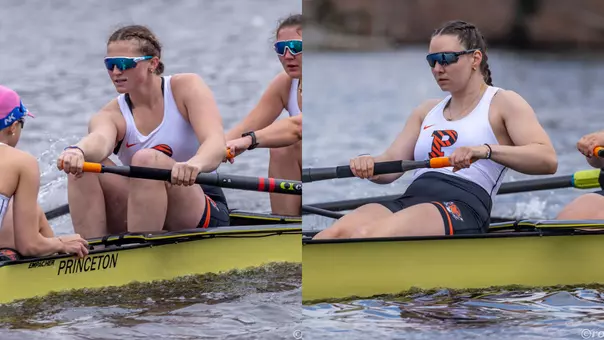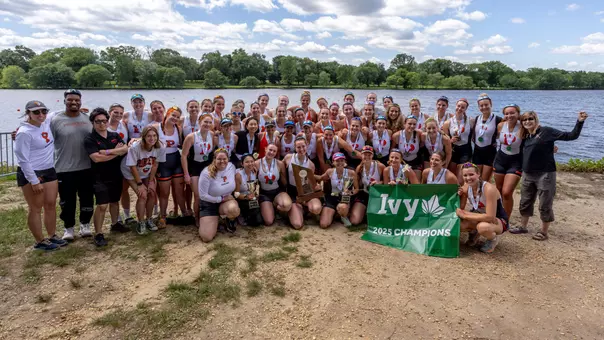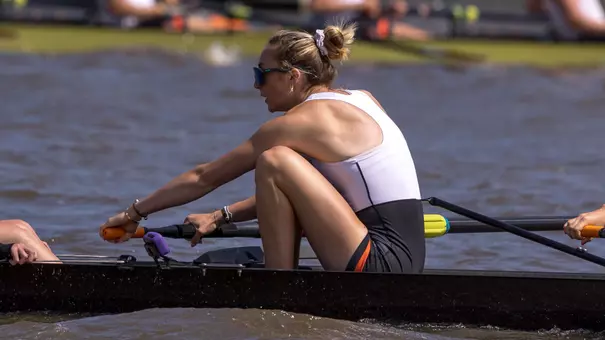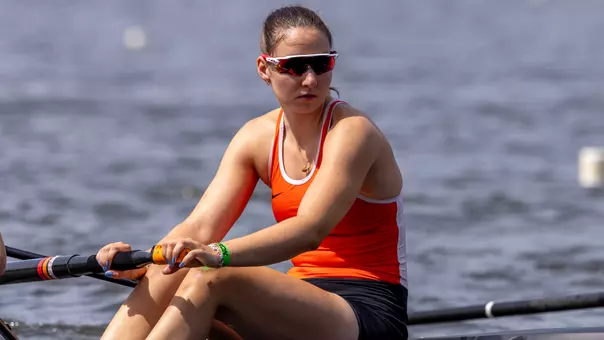Princeton University Athletics
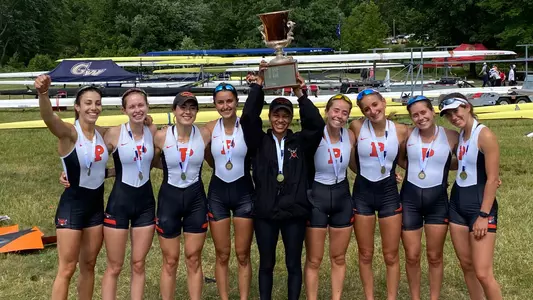
Rowing Celebration Feature: The 2021 Women's Lightweight National Champion
February 28, 2022 | Women's Rowing - Open, Women's Rowing - Lightweight
The 50th anniversary of women’s athletics at Princeton was supposed to be a yearlong celebration, with parties, reunions, and events on campus and around the country. There certainly was no shortage of successes to recognize.
From the first intercollegiate athletic competition for Princeton women in 1970-71 through the winter of 2020, the women athletes of Princeton won 211 Ivy League championships, by far the most of any Ivy League school. Princeton’s women won Olympic medals and national championships, played professionally, competed internationally, and basically have been a model of what college athletics can be. They have been the epitome of the phrase “Education through Athletics,” and their post-Princeton lives have only served as an even greater inspiration for the generations who have followed.
The 49th year of women’s athletics was shaping up as a great one. The field hockey team had already reached the NCAA championship game. The women’s volleyball team had won the Ivy League championship and advanced to the NCAA tournament. The women’s squash team was the national runner-up. The women’s swimming and diving team won the Ivy League title by a remarkable 430 points. The women’s tennis team was ranked 11th in the country.
There was more. The women’s basketball team was sitting at 26-1 at the end of the regular season after having won every Ivy game by double figures. The women’s hockey team had just won the program’s first ECAC championship, defeating No. 1 Cornell in overtime in the championship game, and was headed into the NCAA tournament with as good a chance as any team to win it all. The spring teams were just getting ready to start down their own paths to the postseason.
There were games on Sunday, March 8. The NCAA Zone Diving championships started that Monday, March 9. On Wednesday, March 10, the announcement came: Princeton Athletics were shutting down due to the Covid-19 pandemic. The Princeton campus went from bustling to eerily silent in the snap of a finger. By Friday, campus was empty.
It was April 24, 2021 – nearly fourteen months later – when Princeton teams would again compete. It was the longest break Princeton Athletics had taken since the baseball team played the first intercollegiate event in school history, a game against Williams back in 1864, when Abraham Lincoln was President and the Civil War raged on.
Still, while Princeton Athletics might not have been competing during the pandemic, the connection between athletes, coaches, and alumni might never have been stronger, or more important. In the new Zoom world, Tigers from all generations and all corners of the world met to talk about their experiences, their memories, and the values and life lessons they took from their time as Princeton athletes. The current group stayed in close touch with each other and with their coaches, drawing strength from each other as they navigated the unknowns of their world.
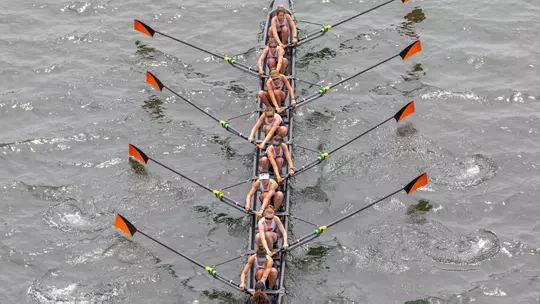
By the second semester of 2021, the opportunity for spring teams to practice together on campus began to be possible. Eventually, the softball, track and field, open rowing, and lightweight rowing teams were able to do what they love to do the most – put on their uniforms and competeThe open rowing team was able to extend its remarkable streak of having raced in every one of the NCAA championships contested, dating back to the first regatta in 1997. The softball team was able to play in its new, albeit temporary, facility. The track and field team sent several of its athletes to the NCAA regionals, and one member of the team, Obiageri Amaechi, advanced to the NCAA championships, where she earned All-American honors.
And, in what was a fitting end to the 50th year of women’s athletics, not to mention a reminder of the overwhelming success that defined those first fifty years, the women’s lightweight team won the 2021 national championship, defeating Wisconsin by 26 seconds.
“For me, it wasn’t over until we crossed the finish line,” says Annie Anezakis. “It was only then that all the uncertainty was gone.”
For this team, getting to the starting line was more difficult than getting to the finish line. With the pandemic in full force, the athletes had little certainty about anything. On the same day that the Ivy League announced it was shutting down spring sports, the Intercollegiate Rowing Association rankings happened to come out for the first time in 2020. The Princeton women’s lightweight rowing team was ranked No. 1.
“I never really considered how serious Covid might be,” says Isabelle Chandler. “Even when everything shut down, I thought maybe halfway through the spring we’d be able to come back. I don’t think it really set in. The hardest thing was the day we got shut down and the rankings came out. It was very upsetting, particularly for the seniors.”
“That day, when the rankings came out, we gathered as a team,” Anezakis says. “We realized it would the last time that we’d sit there together as a full team, 35 women primed to win a national championship.”
Unfortunately, that team would never get to race competitively, and the Class of 2020 never got the chance to race for that national championship. At the time the 2020 IRAs were originally scheduled to be contested, the team members were scattered literally around the world, including Anezakis, who was home in Australia.
It would be just short of a year before she’d be in the same room with any of her teammates again. They’d all spend the rest of the spring of 2020 doing online classes. The same would be true in the fall semester of 2021, and while some students would move back to the Princeton area, none would live on campus. Anezakis did her schoolwork in Australia, where the time zones forced her either to do classes at 1 a.m. or watch taped lectures and change precepts. To make it worse, she even had to deal with her own case of Covid. None of them had it easy.
“The month of August was really hard for me,” says Lauren Sanchez. “I essentially stopped training. There was so much uncertainty about the school year, and then the University announced there would be no on-campus students. I had a rib injury, and that made it hard to just walk. It was a tough month to push through.”
“We were able to keep some sense of community,” Chandler says about those athletes who had housing in Princeton. “We did ergs in a sloped driveway, outside. There were people in town who would walk past us and say, ‘Go Tigers.’ We didn’t know what would happen on the other end. They would cheer us on. They’d say they were happy to see that [we] could be training.”
“Training at that point had a much different feel,” Anezakis says. “We were training to stay fit, rather than to win a national championship. We were training to keep our mental health in check. We trained to keep us together.”
For this team, getting to the starting line was more difficult than getting to the finish line. With the pandemic in full force, the athletes had little certainty about anything. On the same day that the Ivy League announced it was shutting down spring sports, the Intercollegiate Rowing Association rankings happened to come out for the first time in 2020. The Princeton women’s lightweight rowing team was ranked No. 1.
It was in December of 2020 that the University announced that students could live in the dorms in the spring, but their on-campus lives again consisted of online classes. With eating clubs and dining halls closed, they had meals delivered. They were tested for Covid several times a week. They signed a “social contract” in which they agreed to curtail their social lives, all to stay on campus and, hopefully, compete.
“The first day on the water was the best day, by far,” Anezakis says. “We’d been cross training for a year, but it had been a full year since we’d been out on Lake Carnegie. It was a reminder of why we pushed ourselves on the erg, to get on the water, to feel the water.”
It was of little consequence that temperatures were in the low 30s and that it was a very, very snowy winter. Just having the chance to row, and to row together, was all they wanted. Something they’d taken for granted before the pandemic was now something extraordinary.
“When we couldn’t race in 2020, there was a lot of crying,” Sanchez says. “It was so hard to say goodbye to the 2020 class. We were so frustrated for them not to get the chance to race at IRAs. We were very determined to do it in 2021 for them. We went through a lot of highs and lows as the pandemic progressed. We were just hoping for a chance in the spring.”
It was April 24, 2021, when the team had its first race, a win over Drexel. Two weeks later, the Tigers finished second at the Dad Vail Regatta, falling only to Drexel’s open boat. It was three weeks later when the Tigers raced Wisconsin in the IRA championship race, and it was never close. It would be the 56th national championship for Princeton women in the first 50 years (34 team championships, 22 individual).
“The first text I got was from 2020 captain Georgia Helton,” Anezakis says. “She asked for a photo of the trophy. We had a lot of messages from the 2020 teammates. They were saying how proud they were of us. We told them that we were racing for them. It wasn’t just for us. It was for what we all missed out on the previous season. All of their work set us up for this success.”
And what was the long-term lesson from everything they went through? What is it that they take with them after having gone through something so unprecedented and so unbelievable?
“The year was a big lesson on learning to find the good moments in the bad,” Sanchez says. “It was about being grateful for smaller things. It was about being grateful for the teammates who support you. It was about getting back in the spring, going through the phases. It made us appreciate being able to do a workout, even outside on an erg in the snow six feet apart in masks. I did miss out on the traditional Princeton experience and what we’re supposed to do. We missed out on our national title in 2020, but we got a lot of experiences out of it. Within our team, it was great to see how we all came together, how we were able to be there for each other through the pandemic. This shared experience is something we’re not going to forget, and it’ll always bring us even closer together in the future.”
“For me, before Covid, I’d had a tough run with a few injuries,” Anezakis says. “I learned I could overcome any challenge and stay focused on the process. The resilience and strength will help with every other challenge that comes up. I feel super resilient and super strong now. I’m ready to overcome any obstacle. The uncertainty. The question marks. The difficulties. We can face literally anything that is thrown at us.”
“For me,” Chandler says, “what I learned is that if you put your mind to something, you could do it. I learned about my own leadership skills through the pandemic. I was learning how to adapt in these situations and lead with encouragement and through example. The skills I learned this year will stay with me. This was, weirdly, a very special year.”
— by Jerry Price
This story was the prologue in the book “I Can Do Anything … Stories From The First 50 Years Of Women's Athletics At Princeton.” The book can be ordered HERE.









